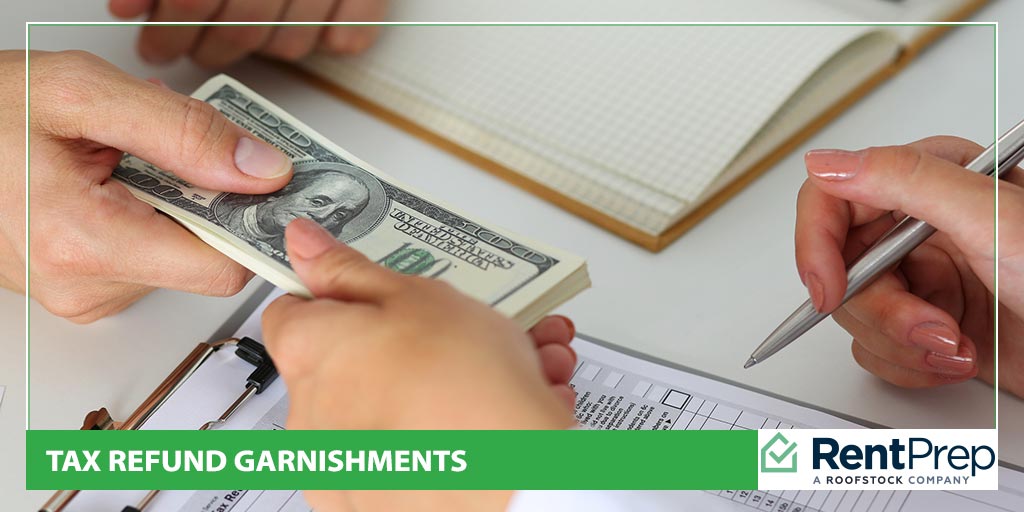
Updated April 2021
After winning an eviction case or other civil court case against a tenant, it’s time to collect what you are owed. Once you have a judgment against a tenant for not paying rent, what happens next?
Learning how to execute tax refund garnishments for past due rent is a great way to collect, but you may be unsure of how the process works or why it is a better choice than going after wages in some cases.
Executing the judgment is by far the hardest part of the collection process, especially considering some states’ restrictions.
For example, New York does not allow you to freeze a bank account unless there is at least $2,500 in it, and every state restricts your ability to garnish wages from someone who is on welfare or employed by the federal government.
For these reasons, often a tax refund garnishment is the easiest and best way to collect on your judgment.
A Table Of Contents On Garnishing Tax Refunds
Learning how to execute tax refund garnishments for past due rent is not a process that all landlords are familiar with. Most new landlords assume they need to learn how to garnish wages, but that’s not necessarily true. Garnishing tax refunds is often a more reliable way to collect after receiving a judgment. Keep reading to learn how this process works.
- 8 Steps: How To Execute Tax Refund Garnishments For Past Due Rent
- Is Tax Refund Garnishment The Better Choice?
- How To Garnish Wages For Unpaid Rent
- FAQs: How Can A Landlord Garnish Wages And Taxes?
8 Steps: How To Execute Tax Refund Garnishments For Past Due Rent

How can a landlord garnish wages when the tenant keeps switching jobs, moves, or is otherwise unable to be reached? Many landlords are left in this situation, where they won their case but have no way to collect. Going to a collections agency is an option in some cases, but most of the time it leaves landlords with little left over to collect.
Instead, landlords can benefit from learning how to execute a garnishment on their former tenants’ tax refunds. This process is not as commonly known, but it is a great way to ensure that you have a better shot at getting the funds you are owed.
Step 1: Do Your Research
Before you do anything else, you want to be sure that your state allows tax refund garnishments. In most cases, private creditors (in this case, that’s you, the landlord) cannot garnish federal tax refunds.
Some states, however, allow state tax refunds to be garnished by private creditors who are owed money.
To find out if you can garnish your tenant’s tax refund, check with the local court where you filed your judgment. They will have the most up-to-date information on what is and what is not allowed.
Step 2: Prepare For The Filing Dates
If your state does allow tax refund garnishment, you need to find out when the upcoming filing dates are going to be. Most states only allow you to file within a certain window. In Michigan for example, the filing dates are from November 1st to December 31st.
Make sure that you are familiar with what the process will be like by continuing to read through RentPrep’s ultimate guide to tax refund garnishments. In general, you should be prepared for the filing well before it’s time to file.
Step 3: Act Fast
When it comes to filing for wage or tax refund garnishment, you always want to file as soon as you are able.
For tax refund garnishment, the funds are going to be distributed on a first-come, first-served basis among eligible creditors. Every state will have a hierarchy of who gets paid first.
For example, most states will pay out overdue child support or taxes before allowing private creditors to collect. The sooner you file your request, the more likely you are to receive some type of payout.
Step 4: Know The Tenant’s Info
Keep yourself up-to-date with the tenant’s information as you approach the filing window. To file, you will need your judgment as well as the following:
- Tenant’s full name
- Tenant’s Social Security number
- Tenant’s last known address
If possible, look over the forms you will need to fill out in advance so you are sure you have all the information needed on record.
Step 5: Pay Fees And File
Once the filing window opens, complete the Non-periodic Garnishment form, like this one for Michigan. Pay the court fees, which typically fall between $15 and $20 depending on the jurisdiction.
Some jurisdictions may allow you to do this online; others will require the form to be filed in person. Once you pay, the court will stamp your documents so they are ready to submit.
Step 6: Mail It Out
The stamped and completed form should be mailed to the appropriate state tax refund department. It is best to send this out by certified mail to ensure its safe and secure arrival.
Step 7: Alert The Tenant
It’s also important that you let the tenant know you have filed to garnish their refund.
Do this by sending the defendant (tenant) a copy of the completed form using their last known address, which may or may not be correct.
Since filing for a tax refund garnishment is not a service-required filing, you do not need proof they received it. You only need proof that you sent it out.
Step 8: Wait It Out
Wait for tax season! If your application is received early enough and approved, you will receive communication about your payout after the tenant has filed their taxes.
Is Tax Refund Garnishment The Better Choice?
Using collection agencies and attorneys for a wage garnishment is always an option, but a tax refund garnishment is by far the most effective method I’ve seen.
I’ve personally spoken with more than a dozen landlords in the past few months who have had success with this method and would adamantly recommend tax refund garnishments to every landlord. Here at RentPrep, we work closely with landlords to learn about what struggles they are facing and how to work through them. This knowledge helps us to continuously improve RentPrep, working to create services that are truly beneficial to those who need them most.
Surprisingly, the recommendations for pursuing tax refund garnishments starkly contrast with landlord opinions on wage garnishment. When you try to garnish wages for rent money, you are often left in a more complex situation. Let’s review how that process works so that you can decide which type of garnishment will best suit your situation.
How To Garnish Wages For Unpaid Rent

Similar to the process for garnishing a tax refund, landlords who want to garnish wages for unpaid rent will need to do a bit of leg work, and that work will involve the local court system. Whether you have an eviction judgment or are simply owed rent, you need to have a money judgment to be able to garnish wages.
If you do not yet have one, most states will require you to go to court for this judgment to prove what you are owed. Once you have this judgment, it can be used to garnish wages. Most of the time, landlords can garnish up to 25% of a tenant’s income until the unpaid rent is paid in full. The specific amount is decided by federal, state, and local laws.
Now that you know how to garnish wages for unpaid rent as well as how tax refund garnishment works, you can make the best decision on what will work to collect any rent you are owed.
Landlord Tip: In my experience, having owned a licensed collection agency, I would not recommend spending any money on wage garnishments, as they are so rarely successful. Because those people in this situation are often struggling financially and have many obligations, there are many ways for former tenants to stop wage garnishment, including changing jobs, filing an order to stop the garnishment, or simply running from their debt. Often, the time and monetary investment required from landlords to garnish wages doesn’t see a good return.
If you’re stuck on the idea, find an attorney or collection agency that will work on a contingency basis. There’s no sense in spending good money to chase money you’ll never get.
Avoiding the need to chase down unpaid rent at all is a better scenario, but how can you make that happen?
Improving your tenant screening process can reduce the risk of ending up in a garnishment situation. High-quality tenant screening services assist in ensuring that you are able to choose the best possible fit for your properties.
Jump-start your tenant screening process with simple, easy-to-use options from RentPrep today.
FAQs: How Can A Landlord Garnish Wages And Taxes?
Can Landlords Garnish Federal Tax Refunds?
No, it is not possible for private creditors to collect debts from federal tax refunds. In this case, landlords are considered private creditors when they are owed money by current or former tenants.
There are a limited number of things that can be taken out of federal tax refunds, and those things are typically taken automatically by the IRS before the money is ever seen by the citizen.
How Much Of A State Tax Refund Can Be Garnished?
The percentage of a state tax refund that can be garnished by any specific group or category of creditor varies from state to state. However, most states with tax refund garnishment in place do not place limits on how much of the refund can be redirected.
If enough debt from private creditors is filed for through garnishments, it is possible that an individual’s entire tax refund can be used up if state law allows this.
Research your own state’s laws to find out what the exact rules are, so that you are prepared if you should ever need to execute a tax refund garnishment.
Can Tenants Object To A Tax Or Wage Garnishment?
There are various ways that a tenant might be able to object to a tax refund garnishment or a wage garnishment.
In the case of tax refund garnishments, tenants can typically file an objection to the garnishment within a certain number of days. If they believe they have been wrongfully treated even outside of this period, it may be possible for them to bring a civil case to court as well. Generally speaking, however, any objections would need to go through the state tax department.
In the case of wage garnishment, former tenants may object to the amount of their wages being garnished. The federal government doesn’t allow more than either 25% of one’s income or however much your income exceeds 30 times the federal minimum wage. Whichever is less is the amount that can be garnished.
Those who file as head of household, however, can often apply for exemptions from this rule, as their income is required to support more than just themselves. This information is not always considered in the original judgment awarded to you, so tenants may be successful in objecting for this reason.
It’s important to remember that the situation is constantly changing when it comes to tracking down the funds you are owed. Stay focused and informed so you are aware of everything that’s happening.
Can Landlords Garnish Wages For Rent Money?
When your tenants are behind on rent, you might become frustrated and wonder why there is nothing you can do to immediately collect. As frustrating as the situation might be, there are not many ways to quickly collect rent unless your tenant sends the funds willingly.
While it is possible for you to garnish wages for rent money as explained in more detail above, this process involves court decisions, official judgments, and time. Overdue rent is not going to be quickly resolved in this way, and the idea of garnishing wages should be reserved for when large amounts of unpaid rent have piled up.
Can Tenants Prevent A Wage Garnishment?
You might be worried about tricky tenants finding a way out of a wage garnishment. Thankfully, most state’s rules prevent this type of situation from happening—at least, not easily.
In Michigan, for example, former tenants looking to stop a wage garnishment would only have three options:
- Pay the debt in full to stop the wage garnishment.
- File an objection to either erase the garnishment or ask for an installment payment plan; the wage garnishment would be put on hold until a decision is made.
- File for bankruptcy.
Most states that allow wage garnishment have very similar rules that limit the ways tenants can avoid their wages being garnished. As a landlord, stick to the system even if you are frustrated by it. The best chance of getting your money back is by having patience, even if it feels like you have been waiting forever.
Do Garnishments Show Up In An Individual’s Credit History?
If wages or taxes are garnished, this information will show up on an individual’s credit history. Not only does this mean that tenants who leave their landlords high and dry will have some liability for this in the future, but it also means you can look out for this issue going forward.
When screening tenants and reviewing reports, keep an eye out for garnishments. Garnishments are a sign that prospective tenants were not able to keep up with their payments, and this is usually a bad sign. Consider the context of this history, but remember that you need to be able to rely on steady financial behavior from your tenants in order to be successful.
Working For What You’re Owed
It’s never fun to have to chase down rent. The situation can always get even more complicated when a tenant leaves without paying rent, is evicted, or simply refuses to pay their rent. When you are owed a substantial amount, however, it can be worth it to look into garnishments.
From learning how to execute tax refund garnishments to garnishing wages, you have a number of options that you can try to get back some of what you’ve lost.
As you move forward, remember that prioritizing tenant screening can help to ensure that you will not need to repeat this situation.

